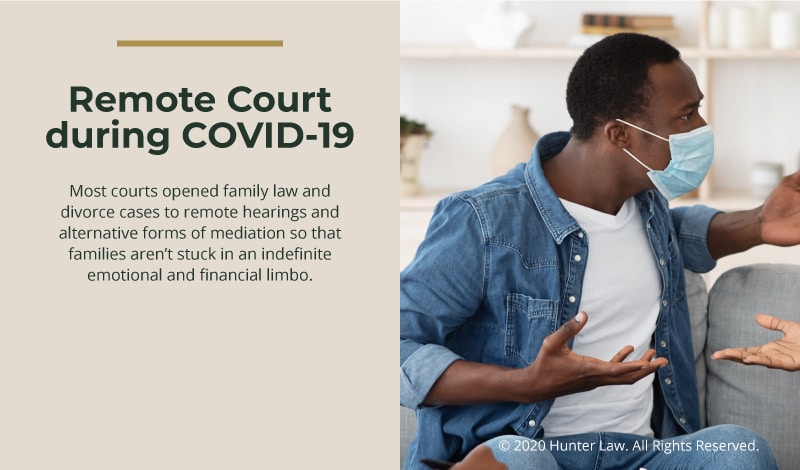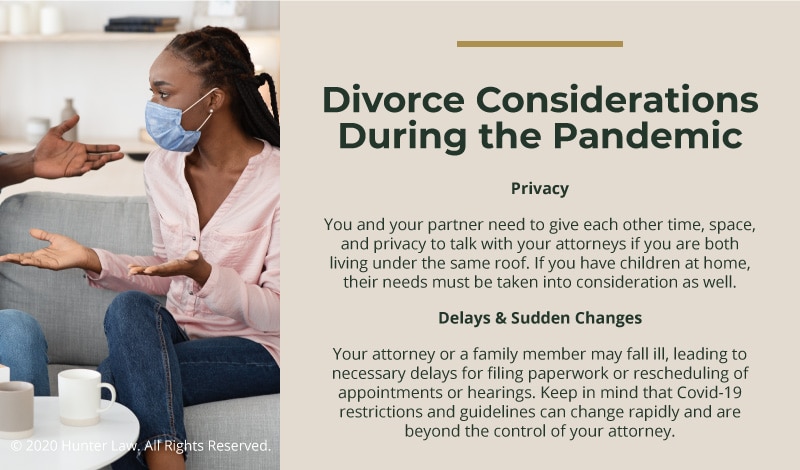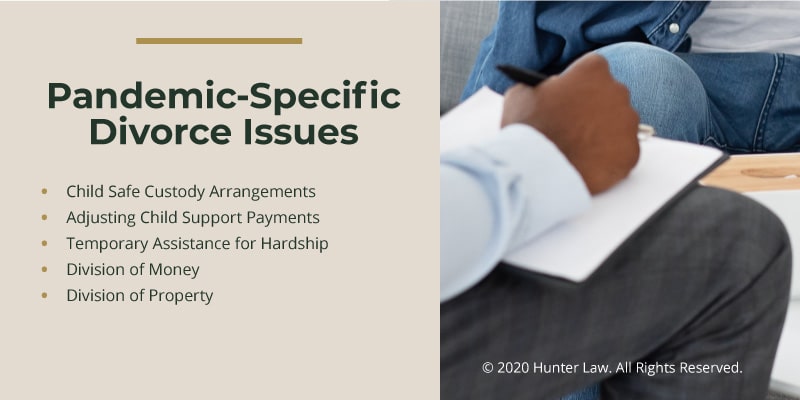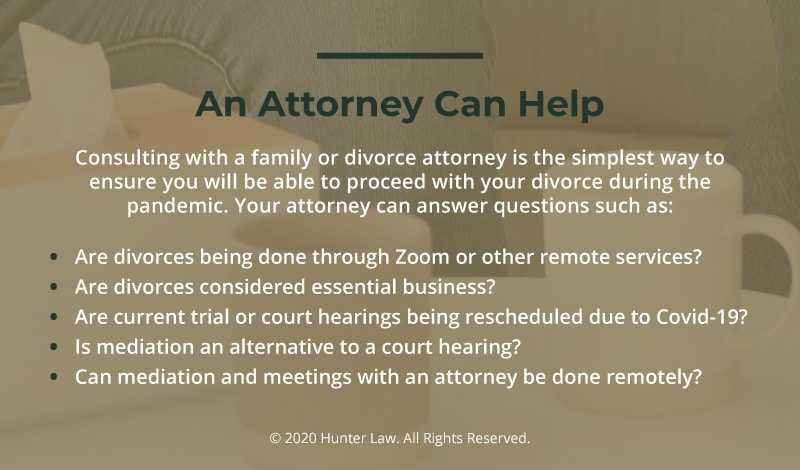Divorce is devastating, messy, and complicated even under normal conditions. During a pandemic like COVID-19, going through a divorce is more distressing for several reasons. There is confusion about getting a divorce (or even if you can) during lockdowns and stay-at-home orders. There are also added stressors due to financial difficulties, fear of illness, housing considerations, and more. At Hunter Law, we work with our clients to ensure their experience as they move through the divorce process minimizes their distress. We want to ensure every detail is handled legally and appropriately.
Court Shut-Downs
Over the past year, COVID-19 led many courts to shut down, putting cases on hold or causing them to be rescheduled. Over several months, it became apparent that the pandemic wasn’t going to end quickly. Most courts opened family law and divorce cases to remote hearings and alternative forms of mediation so that families aren’t stuck in an indefinite emotional and financial limbo.
The Impact of the Pandemic on Florida Divorces
Many couples in Florida have been spending considerably more time together. There are fewer opportunities to get out of the house or apartment, and everyone’s circle of people they interact with is much smaller. As a result, tensions can mount and amplify small differences into significant problems. There is disillusionment and stress as couples learn more about each other than they may have wanted to know.
Forced proximity added to other stressors also leads some couples to reevaluate their life choices. Some decide they no longer want the life they’re leading. During a pandemic, major life changes such as a new career choice or the thought of starting over aren’t uncommon.

Considering Divorce During COVID-19 Pandemic?
If you are ready to file for divorce during the uncertainty of the COVID-19 outbreak, there are several issues to consider. The unusual circumstances will directly affect every aspect of your separation and divorce.
Privacy issues are crucial. If you and your spouse want to get divorced, you should each retain an attorney. Since most attorney/client meetings are done remotely during a pandemic, you need to take the need for privacy and confidentiality into account if you are both living under the same roof. You and your partner need to give each other time, space, and privacy to talk with your attorneys. If you have children at home, their needs must be taken into consideration as well. Just like fighting in front of your children is a bad idea, waging a divorce online in front of them can be devastating.
Delays and sudden changes will be more of an issue during the pandemic. With illness raging across the state, your attorney or a family member may fall ill, leading to necessary delays for filing paperwork or rescheduling of appointments or hearings. Keep in mind that COVID-19 restrictions and guidelines can change rapidly and are beyond the control of your attorney. This adds to your stress, making mediation and hearing negotiations even more difficult for all parties. Try to remember that the pandemic is beyond anyone’s control, but the way you and your partner respond to its challenges can make the outcome of your divorce better for both parties.

The Pandemic Complicates Family Situations
Unfortunately, separating and divorcing are more difficult for families when practical considerations impact the family dynamic. If one or both partners has lost a job, money becomes a more significant issue. Working from home and remote schooling both affect privacy and can reduce the opportunity for intimacy for married couples.
When a couple wants to separate, Covid-19 restrictions can make it difficult or impossible for an individual to relocate. Children may feel they have no respite from family feuds and may develop depression or anger issues when they no longer have the presence of their friends and peers for support.
Divorce during COVID-19 also impacts child support and alimony issues. Most families have been financially affected by the pandemic, leading to a change in lifestyle and reduced available resources. There may be a dramatic shift in financial roles and budgets. Any discussion of child support or alimony during divorce proceedings will need to be considered. While the courts prefer time sharing so children can maintain healthy relationships with both parents, this is more difficult during a pandemic. Lockdowns, stay-at-home-orders, and virtual schooling arrangements affect how much time a child can or will spend with each parent.

Pandemic-Specific Divorce Issues
If a couple has already separated and one parent has the child in their custody, it may not be prudent to move the child or change timesharing arrangements. Timesharing through video chat or telephone may be considered an alternative, but this is decided on each case’s individual merits.
Suppose the child is primarily staying with one parent for the foreseeable future. In that case, child support payments may be adjusted to take into consideration the additional time the child spends at one home. If one parent is exposed to Covid-19 or contracts the disease, the other parent may need an emergency court order to keep the child in a safe location or alter time sharing plans.
If your family situation has undergone changes due to job loss, higher childcare costs, problems with rent or mortgage payments, or other hardships, your divorce attorney may be able to arrange for temporary assistance during the divorce.
Division of property is more difficult during a pandemic. The stock market has been fluctuating wildly, some investments are on the rocks, and determining the value of assets isn’t easy. Dividing money and property fairly will require an experienced attorney who is looking out for your interests.
You have a few options if you own a home. Either one of your can move out of the marital home and let the other individual stay, or you can sell the house and divide the profits. The pandemic complicates both options. Housing values are all over the place, and home sales may be almost impossible in your area. Relocating is also more difficult. For these reasons, property division may take longer to accomplish during the pandemic.
Spousal Abandonment Laws in Florida

Florida Family Courts and COVID-19
Florida courts are currently handling divorces either in a reduced capacity or remotely rather than in-person to protect participants’ health. Court hours have been modified in various locations. You should contact the circuit court in your area to see when and if offices are open and whether any hearings or other proceedings are taking place. Consulting with a family or divorce attorney is the simplest way to ensure you will be able to proceed with your divorce during the pandemic. Your attorney can answer questions such as:
- Are divorces being done through Zoom or other remote services?
- Are divorces considered essential business?
- Are current trial or court hearings being rescheduled due to COVID-19?
- Is mediation an alternative to a court hearing?
- Can mediation and meetings with an attorney be done remotely?
The answers to these questions will vary depending on the current Covid-19 mandates in your locale. Because these can change rapidly, it is best to check on these guidelines to ensure you’re moving forward with your divorce appropriately. In some areas, issues such as time sharing and child custody may be rescheduled or delayed to handle these aspects in person rather than remotely. This is not always the case, however, so check with your local family court.
Remote hearings can be done by computer using software such as Zoom or Skype. In some areas, teleconferencing is also used. Your attorney can tell you what options are available for divorce proceedings in your area. They can also walk you through the process and help you decide whether you want to divorce during COVID-19 or wait until after the pandemic is over, and the court systems return to a more normal state. Please contact us today for consultation.


